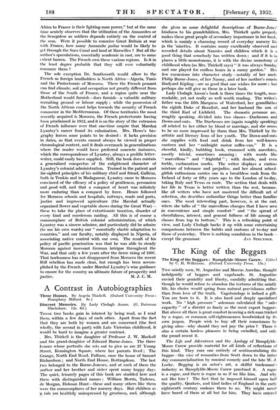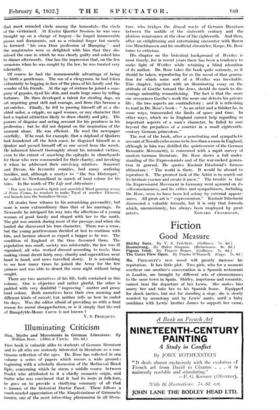The King of the Beggars
The King of the Beggars : Bampfylde-Moore Carew. Edited by C. 11. Wilkinson. (Oxford University Press. 15e.) Two saintly men, St. Augustine and Marcus Aurelius, thought. indulgently of beggars and vagabonds. St. Augustine envied their geniality and liberty, candidly admitting that, though he would refuse to abandon the tortures of the, saintly life, his choice would spring from natural peevishness rather than from love of the truth. Vagabondage is indeed a gift. You are born to it. It is also hard and deeply specialized work. No "high pressure" salesman calculated the "sales capacity" of a district as finely as the most expert begga. rs. But above all there is great comfort in Seeing a rich man tricked by a rogue, or common self-righteousness hoodwinked by it, own jargon. People wish to buy off their consciences by giving alms—why should they not pay the price ? There is also a certain lawless pleasure in being swindled, and only the proud resent it.
The Life and Adventures and the Apology of Bampfylde- Moore Carew provide material for all kinds of reflections of this kind. They cure one entirely of sentimentalizing the beggar—the vice of romantics from Scott down to the latter day commercialization by musical comedy and the late W. J. Locke. Begging is an actor's art, a skilful tradesman's industry as Bampfylde-Moore Carew practised it. A- rogue is a rogue, and there is rogue in us if we like him. And why not like him ? The fact that he imposed himself upon half the quality, Quakers, and kind ladies of England in the early eighteenth century endears them to _us. We might never have heard of them at all but for him. They have entered
that irtiost crowded Circle among the immortals—the circle of the victimized. At Exeter Quarter Sessions he was once brought up on a charge of forgery—he forged innumerable passes and documents, not as a criminal forger but merely to forward _" his own Dear profession of Mtunping "—and the magistrates were so delighted with him that they dis- missed the case in which he was clearly guilty and asked him to dinner afterwards. One has the impression that, on the few occasions when he was caught by the law, he was treated very tolerantly. . .
Of course he had the inmieasurable advantage of being by birth a gentleman.- The son of a clergyman, he had taken voluntarily to begging in face of the pleas of his family and the wonder of his friends. At the age of sixteen he joined a com- pany of gypsies, dyed his skin, and made large sums by telling fortunes. He then developed a talent for stealing dogs, an art requiring great skill and courage, and from this became a rat-catcher. Finally, lie fell to passing himself off as . a dis- abled sailor, a cripple, an aged woman, or any character that laid a. topical attraction likely to draw charity and pity. His powers of disguise and acting account for his greatness in his profession ; but he did- not depend on the inspiration of the moment alone. He was efficient. He read the newspaper carefully. If he read, for example, that a shipload of Quakers had foundered off the Irish coast, he disguised himself as a Quaker and passed himself off as one saved from the wreck. He informed himself thoroughly about his intended victims, even to the extent of searching the epitaphs in churchyards for those who were commended for their charity, and invoking it when lie addressed their surviving relatives. Somerset and Devon, his favourite counties, had many seafaring families, and, although a martyr to " the Sea Distemper," he sailed to Newfoundland in search of local colour for his tales. In the words of The Life and Adventures : "But now Ms resteless Spirit and Unsettled Mind growing weary of Terra Firma, he resolves to make Tryal of another Element, and launch into the boundless Ocean."
All stories bear witness to his astonishing personality, but none is more extraordinary than that of his marriage. In Newcastle he intrigued his way into the affections of-a young woman of good family and eloped with her to the south. The girl was seasick during most of the passage, and when she landed she discovered his true character. There was a scene, but the young gentlewoman decided at last to continue with him, and became almost as expert a beggar as he was. The condition of England at the time favoured them. The population was small, society was aristocratic, the law was ill organized, all who worked dressed according to trade, thus snaking visual deceit fairly easy, charity and superstition went hand in hand, and news travelled slowly. It is astonishing to see how many times he joined the Army for the few guineas and was able to desert the same night without being caught.
There are two narratives of WS life, both contained in this volume. One is objective and rather gleeful, the other is padded with very doubtful " improving " matter and prosy local colour. Both narratives have their own amusing and different kinds_ of naivete', but neither tells us how he ended his days. Was. the editor afraid of providing us wills a final reason for moral disapprolmtion, or is it simply that the end of Bampfylde-Moore Carew is not known?
V. S. _PairCilliTr.









































 Previous page
Previous page